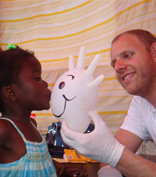-

- 951 NW 13th St.3E Boca Raton, FL 33486 (561) 864-0298 info@bicolclinic.org
-

-


Volunteer: Josh Denson
Bicol Clinic Foundation, Inc.
Philippines, 2008
Prior to last summer, I could not have imagined what life was like for those living in the Philippines. Although I had traveled before to many places, I had never seen conditions like that of the people living near our clinic. Most people didn't have electricity, running water, or even a solid house. Many of the people there just live under a few sticks with a thatch roof, literally. I would go for a run once or twice a week down the street from where we lived and worked. On the run, I would see these homes of people with the mothers carrying laundry to the river and the kids running around with old tires and sticks. This was everyday life for them. There were daily chores that Americans have not thought about in over a hundred years. We just live our lives in such a lucky set of circumstances to be given all that we have. I do not feel that the Filipinos are unhappy how their lives are because that is how their lives are supposed to be. I would not say their lives were any less pleasurable or meaningful than that of Americans or any first world country, but in the Philippines, the simpler and more important things in life stand out.
I am currently a second year medical student at Tulane in New Orleans. At the time of the trip, I had just finished my first year, and knew very little about the clinical aspects of medicine. However, while working in the clinic, I was able to learn skills and perspective which I have been able to apply immensely to my curriculum thus far. Additionally, I intend to apply that same information throughout my career as a doctor. I was able to work for an entire month in the clinic allowing me to experience more than I could have ever imagined. I now feel comfortable with many of the aspects of medicine that used to seem so unfamiliar to me. I am not much of a writer, but I would have to end with one good memory I had while working. A young girl came into the clinic with a very high fever. She was fatigued and clearly not feeling well. To make a long story short, I assured the mother that we would help her daughter the best we could. I continued to give the girl an injection of medicine to reduce her fever and make her feel better. Although her fever did not subside quickly, I monitored her for a few hours, administering Tylenol when needed. The girl soon became more aware to her surroundings when her fever finally reduced to a more normal reading. Her mother was very grateful that we were able to help her daughter in her time of need. She was so thankful that she came back a couple days later with some coconut cookies that she had made for me. This story for me sums up the people of the region and they attitude for what we were doing by trying to help bring them some form of reliable health care. I would not have traded my experiences there for any.
Josh Denson
Tulane University
Medical School
*Note* Since the summer of 2011, Josh Denson has traveled to Haiti with the BCF twice, including immediately after the 2010 earthquake, and also to Nepal where he received a full rotation credit from Tulane University
Want To Join Our Team?
BCF has dispatched more than 150 medical students, in addition to dozens of American and foreign physicians and nurses, to provide care to more than 75,000 patients in the Philippines, Nepal and Haiti, many of whom had never before seen a physician. Our team members also volunteer in orphanages and schools to extend health care to other aspects of life. We’d love for you to be Part of the Start!
Join Our TeamThe application and all additional requirements MUST BE SUBMITTED BY January 21 , 2020.
